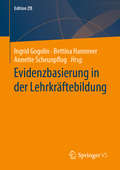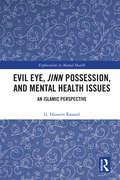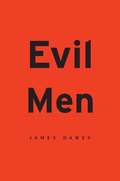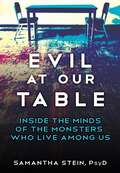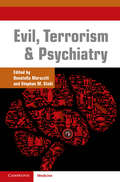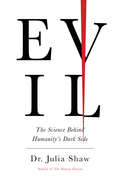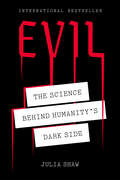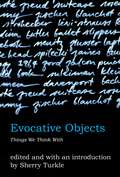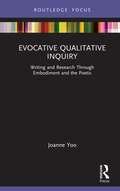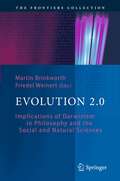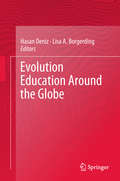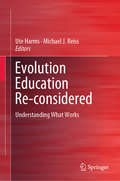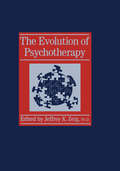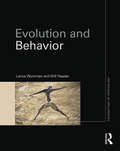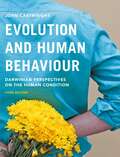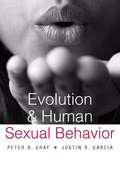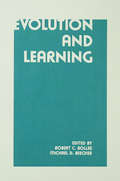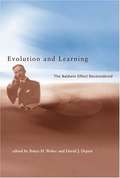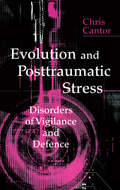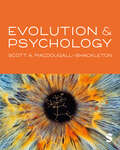- Table View
- List View
Evidenzbasierung in der Lehrkräftebildung (Edition ZfE #4)
by Ingrid Gogolin Bettina Hannover Annette ScheunpflugDas Buch nähert sich dem Thema ‚Datengestützte Lernformate‘ im Kontext der Ausbildung von Lehrerinnen und Lehrern aus einer bilanzierenden Perspektive. Vorgestellt und zusammengefasst werden Rahmenbedingungen, theoretische Begründungen und Zielsetzungen des Reformansatzes. Erfahrungsberichte zur praktischen Umsetzung und der empirischen Überprüfung des innovativen Lernformats ergänzen die Darstellung.
Evil Eye, Jinn Possession, and Mental Health Issues: An Islamic Perspective (Explorations in Mental Health)
by G. Hussein RassoolEvil Eye, Jinn Possession, and Mental Health Issues raises awareness of the cultural considerations, religion and spirituality involved in the assessment of Muslim patients with mental health problems. The belief that Jinn spirits can cause mental illness in humans through affliction or possession is widely accepted among Muslims, meaning this belief is a crucial, but frequently overlooked, aspect of mental health problems with Muslim patients in psychiatric care. This book explores the nature of such beliefs, their relationship to mental health and the reasons for their importance in clinical practice. The book argues that it is vital to consider mental disorders as a multifactorial affair, in which spiritual, social, psychological and physical factors may all play a role. It suggests differential diagnostic skills may have an important part to play in offering help to those who believe their problems are caused by possession, and provides accessible literature on clinical issues and practice, interventions, management and evidence-based practice to help health workers achieve a better understanding of Muslim beliefs about possession and how to work with patients that hold such beliefs. Evil Eye, Jinn Possession, and Mental Health Issues is an essential manual for mental health professionals, social workers and psychologists. It should also be of interest to academics and students in the healthcare sciences.
Evil Genes: Why Rome Fell, Hitler Rose, Enron Failed, and My Sister Stole My Mother's Boyfri end
by Barbara Oakley Ph.DHave you ever heard of a person who left you wondering, "How could someone be so twisted? So evil?" Prompted by clues in her sister's diary after her mysterious death, author Barbara Oakley takes the reader inside the head of the kinds of malevolent people you know, perhaps all too well, but could never understand. Starting with psychology as a frame of reference, Oakley uses cutting-edge images of the working brain to provide startling support for the idea that "evil" people act the way they do mainly as the result of a dysfunction. In fact, some deceitful, manipulative, and even sadistic behavior appears to be programmed genetically-suggesting that some people really are born to be bad. Oakley links the latest findings of molecular research to a wide array of seemingly unrelated historical and current phenomena, from the harems of the Ottomans and the chummy jokes of "Uncle Joe" Stalin, to the remarkable memory of investor Warren Buffet. Throughout, she never loses sight of the personal cost of evil genes as she unravels the mystery surrounding her sister's enigmatic life-and death. Evil Genes is a tour-de-force of popular science writing that brilliantly melds scientific research with intriguing family history and puts both a human and scientific face to evil.
Evil Genes: Why Rome Fell, Hitler Rose, Enron Failed, and My Sister Stole My Mother's Boyfriend
by Barbara A. OakleyAdventurer, writer, business executive, academic, and so on, Oakley (engineering, Oakland U. , Michigan) draws on her studies in bioengineering to offer genetic explanations for why some people are naturally exploitative, and so often succeed at it from the global to the family scale.
Evil Men
by James DawesA searching meditation on our all-too-human capacity for inhumanity, Evil Men confronts atrocity head-on-how it looks and feels, what motivates it, how it can be stopped. James Dawes’s unflinchingly honest account, drawing on firsthand interviews, is not just about the things Japanese war criminals did, but about what it means to befriend them.
Evil at Our Table: Inside the Minds of the Monsters Who Live Among Us
by Samantha SteinWritten from a never-before-seen perspective, a real-life Mindhunter&’s provocative true crime memoir takes readers inside the prison interview room—and the minds—of serious sex offenders, as she assesses the fates of those charged with the most disturbing acts imaginable. Once inside the prison system, how can a pathological, sexual sadist who needs to be confined to a mental institution, be distinguished from the perpetrator of a sexual crime who is unlikely to ever transgress again? And who can say? Working under California's Sexually Violent Predator Law, Samantha Stein, PsyD, faces such offenders alone, one by one, in a prison interview room. As a forensic psychologist, her high-stakes decisions can determine the difference between a life lived back in society or one condemned to indefinite incarceration. For Dr. Stein, despite the science she relies on, it&’s a profound responsibility that comes with a prayer: &“Please don&’t let me have been wrong.&” Confronting evil, yet never approaching an evaluation with damning preconceptions, Dr. Stein opens her mind to her subjects&’ life stories—their crimes, their grim pathologies, their frustrations and demons, their childhoods, their sociopathic reasoning, and often, too, their genuine and civilized regret. She doesn&’t hesitate to hold them accountable, but she acknowledges their humanity. She studies the face, eyes, posture, and the lies, yet admits that predicting human behavior can be dicey. Part forensics, part exploration of human nature, Evil at Our Table is the first in-depth account by a treatment provider and evaluator in the field. Here, Dr. Stein not only reveals the details of specific cases—and the outcomes—but also delves into the sometimes-overwhelming impact on her personal life. Told with empathy, uncompromising honesty, and insight from a unique and experienced perspective, in this important book, Dr. Stein investigates salient issues of our time: the intersection of good and evil, crime, punishment, law, and psychology, and our very humanity, as well as how to achieve a sane balance between community safety and civil liberties—all the while facing the monsters among us.
Evil in the Modern World: International and Interdisciplinary Perspectives
by Laura Dryjanska Giorgio PacificiThis interesting volume focuses on a set of phenomena which increasingly alarm the political world and public opinion: from the more obvious ones like torture, disease, human trafficking, abuse, genocide, displacement, to more subtle forms found in sports, technology and law. It looks at how and why these phenomena are universally condemned, and could be considered to threaten the very foundations of modern democracy; yet continue to be tolerated. The volume therefore goes beyond what Hannah Arendt has called the "banality of evil" and discusses the presence of condemned and heinous practices in society as fluid and chaotic but as non-trivial; capable of great transmutations through various epochs. Practices and actions considered as "evil" manifest in situations where individuals or groups hold power or seize power, and the contributions in this volume explore the close relation between power and evil. The volume draws upon sociology, psychology, cultural studies, political science, as well as philosophy, theology, anthropology, and neurology of the individual and of the group to provide a comprehensive understanding of the multiple facets of evil in the contemporary world.
Evil, Terrorism and Psychiatry: Stahl Essential Psychopharmacology Handbooks
by Stephen M. Stahl Donatella MarazzitiTerrorism has dominated the domestic and international landscape since 9/11. Determining what drives people to commit acts of terrorism is no easy task. The important new book fills a gap in the psychology and psychiatry literature by examining the relationship between evil and mental illness, and in particular amongst terrorists. How can evil, a characteristic of human nature, become extreme, intent on destruction and lead to acts of terrorism? Featuring contributions from leading experts in this field, Evil, Terrorism and Psychiatry explores whether there are specific personality traits, psychological characteristics or psychopathological conditions that may favour a lack of control of violence in terrorists. It also offers possible novel prevention strategies to help understand and prevent these acts in future. Featuring articles from a special issue of CNS Spectrums, this book also includes brand new chapters found exclusively in this book.
Evil: The Science Behind Humanity's Dark Side
by Julia ShawAn original and scientifically rigorous exploration of the darkest recesses of the human mind.What is it about evil that we find so compelling? From our obsession with serial killers to violence in pop culture, we seem inescapably drawn to the stories of monstrous acts and the aberrant people who commit them. But evil, Dr. Julia Shaw argues, is all relative, rooted in our unique cultures. What one may consider normal, like sex before marriage, eating meat or being a banker, others may find abhorrent. And if evil is only in the eye of the beholder, can it be said to exist at all?In Evil, Dr. Shaw uses case studies from academia, examples from popular culture and anecdotes from everyday life to break down complex information and concepts such as the neuroscience of evil, the psychology of bloodlust and workplace misbehaviour. In grappling with thorny dilemmas--from "Would I kill baby Hitler?" to "Why do I want to murder my spouse?"--Dr. Shaw offers readers a better understanding of the world, ourselves and our Google search histories.
Evil: The Science Behind Humanity's Dark Side
by Julia ShawAn expert in criminology and psychology uses science to understand evil in today’s society.What is it about evil that we find so compelling? From our obsession with serial killers to violence in pop culture, we seem inescapably drawn to the stories of monstrous acts and the aberrant people who commit them. But evil, Dr. Julia Shaw argues, is largely subjective. What one may consider normal, like sex before marriage, eating meat, or working on Wall Street, others find abhorrent. And if evil is only in the eye of the beholder, can it be said to exist at all? In Evil, Shaw uses an engrossing mix of science, popular culture, and real-life examples to break down timely and provocative issues. How similar is your brain to a psychopath’s? How many people have murder fantasies? Can artificial intelligence be evil? Do your sexual proclivities make you a bad person? Who becomes a terrorist? If you could travel back in time, would you kill baby Hitler? In asking these questions, Shaw urges readers to discover empathy and to rethink and reshape what it means to be bad. Evil is a wide-ranging exploration into a fascinating, darkly compelling subject from wickedly smart and talented writer.Praise for Evil“A brilliant panorama that elucidates humanity’s dark side. . . . This science-based foundation for studying the minds of sadists, mass murderers, freaks and creeps, as well the new role of tech in promoting evil is presented in a totally engaging fashion.” —Philip Zimbardo, PhD; Professor Emeritus, Stanford University; author of The Lucifer Effect“This overview of various kinds of aberrant behavior grouped under the umbrella term evil is well backed up by the expertise of Shaw. . . . Shaw’s work will be particularly appropriate for college and high school libraries for its sober-minded, academically rigorous examination of an oft-sensationalized subject.” —Publishers Weekly“Capably written with a smooth mix of scientific insight and theoretical thought, the book will hopefully inspire empathy and understanding rather than hysteria and condemnation. A consistently fascinating journey into the darker sides of the human condition that will push on the boundaries of readers’ comfort zones.” —Kirkus Reviews
Evocative Objects: Things We Think With
by Sherry Turkle Graham MindellFor Sherry Turkle, "We think with the objects we love; we love the objects we think with." In Evocative Objects, Turkle collects writings by scientists, humanists, artists, and designers that trace the power of everyday things. These essays reveal objects as emotional and intellectual companions that anchor memory, sustain relationships, and provoke new ideas.These days, scholars show new interest in the importance of the concrete. This volume's special contribution is its focus on everyday riches: the simplest of objects—an apple, a datebook, a laptop computer—are shown to bring philosophy down to earth. The poet contends, "No ideas but in things." The notion of evocative objects goes further: objects carry both ideas and passions. In our relations to things, thought and feeling are inseparable. <p><p> Whether it's a student's beloved 1964 Ford Falcon (left behind for a station wagon and motherhood), or a cello that inspires a meditation on fatherhood, the intimate objects in this collection are used to reflect on larger themes—the role of objects in design and play, discipline and desire, history and exchange, mourning and memory, transition and passage, meditation and new vision.In the interest of enriching these connections, Turkle pairs each autobiographical essay with a text from philosophy, history, literature, or theory, creating juxtapositions at once playful and profound. So we have Howard Gardner's keyboards and Lev Vygotsky's hobbyhorses; William Mitchell's Melbourne train and Roland Barthes' pleasures of text; Joseph Cevetello's glucometer and Donna Haraway's cyborgs. Each essay is framed by images that are themselves evocative. Essays by Turkle begin and end the collection, inviting us to look more closely at the everyday objects of our lives, the familiar objects that drive our routines, hold our affections, and open out our world in unexpected ways.
Evocative Qualitative Inquiry: Writing and Research Through Embodiment and the Poetic
by Joanne YooEvocative Qualitative Inquiry explores academic research that evokes vitality and life. It provides a road map into integrating the personal with professional to engage in intrinsically meaningful forms of inquiry. The book centers on the key considerations of engaging in evocative forms of writing in the academy. It depicts academic inquiry as an embodied process that is captured and understood through rhythm and resonance. It relays how pleasurable, sensory, and rhythmic forms of inquiry can engender a sense of timelessness, expansiveness, growth, and generativity. Evocative Qualitative Inquiry relates the challenges that may arise from following this less trodden academic inquiry path. It conveys the importance of faith and courage in forging one’s own unique and authentic writing voice. The book concludes with an analogy of a poker game to illustrate how all academic writers possess the embodied capacity to write vibrant words that evoke. Finally, each chapter ends with reflection questions and activities to help readers practice the skills of writing evocatively. This book will be a valuable guide for those seeking evocative writing techniques to engage in vibrant forms of academic research. It is primarily written for academics who desire to learn more about creative, poetic, and embodied writing methodologies.
Evolution 2.0
by Friedel Weinert Martin BrinkworthThese essays by leading philosophers and scientists focus on recent ideas at the forefront of modern Darwinism, showcasing and exploring the challenges they raise as well as open problems. This interdisciplinary volume is unique in that it addresses the key notions of evolutionary theory in approaches to the mind, in the philosophy of biology, in the social sciences and humanities; furthermore it considers recent challenges to, and extensions of, Neo-Darwinism. The essays demonstrate that Darwinism is an evolving paradigm, with a sphere of influence far greater than even Darwin is likely to have imagined when he published 'On the Origin of Species' in 1859.
Evolution Education Around the Globe
by Hasan Deniz Lisa A. BorgerdingThis edited book provides a global view on evolution education. It describes the state of evolution education in different countries that are representative of geographical regions around the globe such as Eastern Europe, Western Europe, North Africa, South Africa, North America, South America,Middle East, Far East, South East Asia, Australia, and New Zealand.Studies in evolution education literature can be divided into three main categories: (a) understanding the interrelationships among cognitive, affective, epistemological, and religious factors that are related to peoples’ views about evolution, (b) designing, implementing, evaluating evolution education curriculum that reflects contemporary evolution understanding, and (c) reducing antievolutionary attitudes. This volume systematically summarizes the evolution education literature across these three categories for each country or geographical region. The individual chapters thus include common elements that facilitate a cross-cultural meta-analysis. Written for a primarily academic audience, this book provides a much-needed common background for future evolution education research across the globe.
Evolution Education Re-considered: Understanding What Works
by Michael J. Reiss Ute HarmsThis collection presents research-based interventions using existing knowledge to produce new pedagogies to teach evolution to learners more successfully, whether in schools or elsewhere. ‘Success’ here is measured as cognitive gains, as acceptance of evolution or an increased desire to continue to learn about it. Aside from introductory and concluding chapters by the editors, each chapter consists of a research-based intervention intended to enable evolution to be taught successfully; all these interventions have been researched and evaluated by the chapters’ authors and the findings are presented along with discussions of the implications. The result is an important compendium of studies from around the word conducted both inside and outside of school. The volume is unique and provides an essential reference point and platform for future work for the foreseeable future.
Evolution Of Psychotherapy: The 1st Conference
by Jeffrey K. ZeigFirst published in 1987. The Milton H. Erickson Foundation, Inc. is a federal non-profit corporation. It was formed to promote and advance the contributions made to the health sciences by the late Milton H. Erickson, M.D., during his long and distinguished career. This volume is a collection of the papers from video-taped sessions at first Evolution of Psychotherapy Conference.
Evolution and Behavior
by Lance Workman Will ReaderThe relationship between how we evolved and how we behave is a controversial and fascinating field of study. From how we choose a mate to how we socialize with other people, the evolutionary process has an enduring legacy on the way we view the world. Evolution and Behavior provides students with a thorough and accessible introduction to this growing discipline. Placing evolutionary psychology in context with the core areas of psychology – developmental, cognitive and social – the book explores some of the most fundamental questions we can ask about ourselves. Taking students through the principles of natural selection, it provides a nuanced understanding of key topics such as: cognitive development and the role of intelligence, memory, emotions and perception, mental health and abnormal psychology, sexual reproduction and family relationships, the development of culture. Addressing a number of controversial debates in the field, each chapter also includes concept boxes, the definition of key terms, chapter summaries and further reading. This is the ideal introductory textbook for anyone interested in evolutionary psychology. It will provide not only an essential overview of this emerging field, but also deepen readers’ appreciation of the core tenets of psychology as a whole.
Evolution and Human Behaviour: Darwinian Perspectives on the Human Condition
by John CartwrightOur experience of the world is driven by processes common to all animals: growth, survival, reproduction and death. Evolution and Human Behaviour explores the complexities of the human experience through the lens of Darwinism, drawing on a long and vibrant tradition of different theories and interpretations. This textbook offers a compelling synthesis of key concepts, addressing human thought, feeling and behaviour in fundamental evolutionary terms. This is a essential text for undergraduate students taking courses in psychology, human biology, ethology, anthropology and human behavioural ecology, providing an insightful and comprehensive introduction for anyone who wishes to understand how human behaviour has evolved. New to this Edition: - Additional chapters on health and disease, homosexuality, the nature of adaptations and life history theory. - Includes brand-new material on epigenetics, patterns of crime, error management theory, moral foundations theory, religion and gene culture co-evolution. - Now accompanied by a companion website offering additional reading material and useful practice questions - New 'controversy' boxes in each chapter, providing ideas for essay topics and classroom discussion
Evolution and Human Sexual Behavior
by Peter B. Gray Justin R. GarciaA comprehensive survey of the evolutionary science of human sexual behavior, Evolution and Human Sexual Behavior invites us to imagine human sex from the vantage point of our primate cousins, in order to underscore the role of evolution in shaping all that happens, biologically and behaviorally, when romantic passions are aroused.
Evolution and Learning
by Robert C. Bolles Michael D. BeecherFirst published in 1987. Routledge is an imprint of Taylor & Francis, an informa company.
Evolution and Learning: The Baldwin Effect Reconsidered
by Bruce H. Weber David J. DepewThe role of genetic inheritance dominates current evolutionary theory. At the end of the nineteenth century, however, several evolutionary theorists independently speculated that learned behaviors could also affect the direction and rate of evolutionary change. This notion was called the Baldwin effect, after the psychologist James Mark Baldwin. In recent years, philosophers and theorists of a variety of ontological and epistemological backgrounds have begun to employ the Baldwin effect in their accounts of the evolutionary emergence of mind and of how mind, through behavior, might affect evolution. The essays in this book discuss the originally proposed Baldwin effect, how it was modified over time, and its possible contribution to contemporary empirical and theoretical evolutionary studies. The topics include the effect of the modern evolutionary synthesis on the notion of the Baldwin effect, the nature and role of niche construction in contemporary evolutionary theory, the Baldwin effect in the context of developmental systems theory, the possible role of the Baldwin effect in computational cognitive science biosemiotics, and the emergence of consciousness and language.
Evolution and Posttraumatic Stress: Disorders of Vigilance and Defence
by Chris CantorPosttraumatic Stress Disorder remains one of the most contentious and poorly understood psychiatric disorders. Evolution and Posttraumatic Stress provides a valuable new perspective on its nature and causes. This book is the first to examine PTSD from an evolutionary perspective. Beginning with a review of conventional theories, Chris Cantor provides a clear and succinct overview of the history, clinical features and epidemiology of PTSD before going on to introduce and integrate evolutionary theory. Subjects discussed include: The evolution of human defensive behaviours A clinical perspective of PTSD Defence in overdrive: evolution, PTSD and parsimony This original presentation of PTSD as a defensive strategy describes how the use of evolutionary theory provides a more coherent and successful model for diagnosis, greatly improving understanding of usually mystifying symptoms. It will be of great interest to psychiatrists, psychotherapists, psychologists, and anthropologists.
Evolution and Psychology
by Scott A. MacDougall-ShackletonEvolution and Psychology is a critical exploration of how evolutionary approaches can be used to understand the human mind and behaviour. Written for undergraduate students in the social sciences, this text provides an accessible introduction to foundational concepts in evolutionary biology. It then explores evolutionary perspectives on key psychological topics such as cognition, development, group dynamics, mate choice, language and communication, psychopathology, and culture. An interdisciplinary approach is woven throughout, integrating evolutionary psychology with insights from behavioural ecology, anthropology, genetics, and neuroscience. You will learn to think critically about evolutionary explanations, with Warning Flag features throughout the text that address frequently misunderstood topics, common fallacies, and historical misuses and abuses of applying evolutionary theory to human behaviour. This is an essential read for students of Evolutionary Psychology and anyone looking for a contemporary overview of this complex and captivating field. Scott A. MacDougall-Shackleton is Professor of Psychology at Western University.
Evolution and Psychology
by Scott A. MacDougall-ShackletonEvolution and Psychology is a critical exploration of how evolutionary approaches can be used to understand the human mind and behaviour. Written for undergraduate students in the social sciences, this text provides an accessible introduction to foundational concepts in evolutionary biology. It then explores evolutionary perspectives on key psychological topics such as cognition, development, group dynamics, mate choice, language and communication, psychopathology, and culture. An interdisciplinary approach is woven throughout, integrating evolutionary psychology with insights from behavioural ecology, anthropology, genetics, and neuroscience. You will learn to think critically about evolutionary explanations, with Warning Flag features throughout the text that address frequently misunderstood topics, common fallacies, and historical misuses and abuses of applying evolutionary theory to human behaviour. This is an essential read for students of Evolutionary Psychology and anyone looking for a contemporary overview of this complex and captivating field. Scott A. MacDougall-Shackleton is Professor of Psychology at Western University.
Evolution and Rationality
by Samir Okasha Ken BinmoreThis volume explores from multiple perspectives the subtle and interesting relationship between the theory of rational choice and Darwinian evolution. In rational choice theory, agents are assumed to make choices that maximize their utility; in evolution, natural selection 'chooses' between phenotypes according to the criterion of fitness maximization. So there is a parallel between utility in rational choice theory and fitness in Darwinian theory. This conceptual link between fitness and utility is mirrored by the interesting parallels between formal models of evolution and rational choice. The essays in this volume, by leading philosophers, economists, biologists and psychologists, explore the connection between evolution and rational choice in a number of different contexts, including choice under uncertainty, strategic decision making and pro-social behaviour. They will be of interest to students and researchers in philosophy of science, evolutionary biology, economics and psychology.
